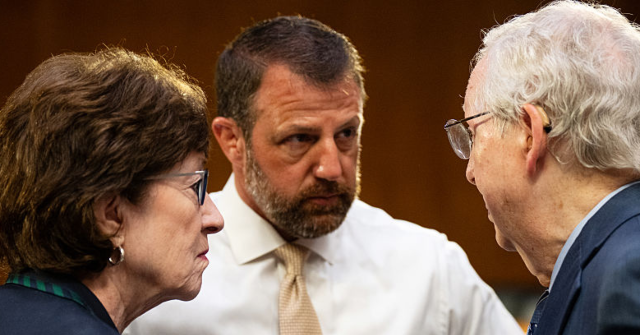Democrats are obstructing qualified nominees of President Donald Trump, but there are things Republicans can do to push them harder, Sen. Markwayne Mullin (R-OK) explained during an appearance on Breitbart News Saturday.
Mullin explained that they have to approve nearly 1,200 nominees for the president, and typically, “a big chunk of those go through voice vote,” which speeds the entire process up.
“But the Democrats have chosen to do this the absolute nuclear option way, which is the hard way,” he said, walking through some historical stats showcasing that 91 percent of President H.W. Bush’s nominees went to voice vote or unanimous consent.
“Underneath Clinton, 98 percent that went through voice vote or unanimous consent. Underneath Bush 43 they had 90 percent went through voice vote or unanimous consent; 90 percent for Obama. You go to Trump — 1.0 Trump 45, he had — roughly 44 percent of his went through voice vote,” he said, noting that former President Joe Biden had about 60 percent go through voice vote or unanimous consent.
“Right now, where we stand right now as we speak, they have not let one single nominee go through voice vote, meaning that they have filibustered every single one but one,” he said, which was Secretary of State Marco Rubio. And even then, Mullin said Democrats still debated him.
This has “almost grinded the Senate to a halt,” he said, noting that Trump is upset because Democrats are abusing their power.
“President Trump has the right to put his picks in place. That means ambassadors, that means people inside the DOD to defend this great nation. That means people at every agency that we have that works around the country — which is, you know, some of them, honestly, are too big — but he has a right to put his people in place, and the Democrats are blocking that,” Mullin said.
However, he said Senate Majority Leader John Thune (R-SD) has done a good job handling this, keeping them in session.
“And that’s that’s not just this weekend. That’s throughout the whole year. We have voted — we have voted on more votes than the last 35 years of any Senate we have been in, been in consecutive days more than any Senate in the last 15 years,” he said.
“So what we’re faced with today, Matt, is one: either we’re going to force a recess, and a recess isn’t just as simple as calling recess,” he said, noting it is complicated because of procedures. For instance, the House would have to agree, and the House has already left D.C.
“So they’re literally scattered all over the world right now, and so for us to go into recession, two options. One is Article II, Section III where the president of the United States puts us into recess, but that’s only if the both chambers are in an impasse, meaning that we’re in a disagreement. We disagree on two issues, and we can’t go past it. In order to do that, the President then will declare us into recess for a set amount of date. Well, since the House isn’t in, he can’t recess us because we’re not at the impasse. They haven’t taken a vote,” he explained.
“The other option that we have is that the Senate declares that we’re going to go into a recess,” the senator said, explaining that this is “amenable.”
“So we have to so they can amend it, meaning that the Democrats can drag it out for a few days. Once we finally get to the point where we wear them down and we pass it, then it’s got to go to the House, the House will have to reconvene. It’ll take them roughly three days to reconvene, if they can do it even that quick, and then they have to amend it if they choose to. And then once they vote on it, they send it back to us, and we have to vote on it again once we finally do agree, both chambers agree to go into recess,” he said, laying out a few other procedures and laying out what they can realistically do.
As Mullin sees it, the options are to strike a deal with Senate Minority Leader Chuck Schumer (D-NY), try to force a recess, or “hammer out a full rule change.”
“And the rule change would take a lot of time, because it’s not just simple to do a simple rule change,” the senator said.
Ultimately, he predicted that they will probably get a deal and eventually a rule change in several weeks.
“I think both of those will go so that’s my that’s my bet. But the best thing is, when you’re negotiating, Matt, when you have option A, B, and C, you don’t have to just stick to one if we don’t get a good deal. So we got two other options, and that is the best place for Republicans to be to negotiate, is negotiating from a point of strength — not from desperation,” he added.
LISTEN:
Breitbart News Saturday airs on SiriusXM Patriot 125 from 10:00 a.m. to 1:00 p.m. Eastern.
Read the full article here


